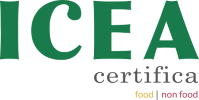Organic catering certifies restaurants, canteens, cooking centres, gastronomy, bars, hotel, spa facilities, and wellness centres.
Identifies and enhances all catering establishments offering organic ingredients and menus, local produce and Fairtrade.
What it is certified
An organic catering company offers the careful consumer greater guarantees thanks to parameters such as quality and wholesomeness of food and responds appropriately to the growing demand for dishes and menus using ingredients from organic farming.
The Community legislation in force Regulation (EC) No. 834/07 and (EC) No. 889/08, excludes organic caterers from the obligations to be subject to the regulated control system imposed on other operators in the production chain.
ICEA offers a voluntary certification system, which makes up for this regulatory deficiency of the compulsory inspection system.
The specification adopted by ICEA defines the minimum service requirements, control rules and consumer information rules applicable to catering, reinterpreting for this sector the criteria and principles laid down by the Regulation (EC) No. 834/07 and (EC) No. 889/08 for preparation units.
There is a minimum threshold of 30% to be able to make any mention of organic produce in the list of ingredients and menus. A restaurant can be defined as ‘Organic’ only if it uses at least 95% of organic ingredients, calculated based on the purchase turnover of all foodstuffs (excluding fish and wine). Similar criteria also applies to other catering facilities: canteens, cooking centres, gastronomy, bars, hotels and spas, wellness centres, etc.
In addition to ensuring the actual use of organic ingredients, ICEA certification also enhances other environmental and social sustainability requirements expected and appreciated by consumers.
Compliance with ECO, FAIR and LOCAL voluntary requirements allows the acquisition of additional scores for measuring and enhance the ecological and social sustainability performance of the service.
Icea Biological Catering certification guarantees reliability and a safe service to consumers and public and private clients, integrating with other certifications and service requirements: gluten-free, vegetarian o vegan.
How to certify
The certification process is divided into four main phases.
1. Initial assessment of menus, suppliers and organic products used. Activities not dedicated to organic produce shall provide the recipes for quantitative preparation and define working procedures to prevent admixtures and contamination during preparation and allow the reporting of the dishes served.
2. On-site inspection to verify the effective use of the organic products declared and the correct application of the remaining requirements laid down in the specification. Inspectors will also check registered purchase documents and invoices and may carry out sampling for analysis.
3. Issue of the Certificate of Conformity based on information and data collected as part of the evaluation and verification process. The certificate shows the classification of the premises – “Organic Ingredients”, “Organic Menu” and “Organic Restaurant” – in relation to the extension of the use of organic ingredients/products, as well as the expression of the performance Eco, Fair and Local (from 1 to 5 cherry tomatoes).
4. Annual surveillance through periodic inspections and analysis to confirm that the conditions of compliance have been maintained.
Documents and downloadable files
[button color=”green” size=”normal” alignment=”none” rel=”follow” openin=”newwindow” url=”https://www.icea.bio/wp-content/uploads/2017/01/1.Disciplinare-Ristorazione-bio-3B.2-Ristorazione-biologica-ICEA-Istituto-di-Certificazione-Etica-e-Ambientale.pdf”]Specification[/button]
[button color=”green” size=”normal” alignment=”none” rel=”follow” openin=”newwindow” url=”https://www.icea.bio/wp-content/uploads/2017/01/2.-Regolamento-per-la-certificazione-volontaria-3B.2-Ristorazione-biologica-ICEA-Istituto-di-Certificazione-Etica-e-Ambientale.pdf”]Regulation[/button]
[button color=”green” size=”normal” alignment=”none” rel=”follow” openin=”newwindow” url=”https://www.icea.bio/wp-content/uploads/2017/01/3.-Richiesta-certificazione-3B.2-Ristorazione-biologica-ICEA-Istituto-di-Certificazione-Etica-e-Ambientale.docx”]Request[/button]
[button color=”green” size=”normal” alignment=”none” rel=”follow” openin=”newwindow” url=”https://www.icea.bio/wp-content/uploads/2017/01/4.-Tariffario-certificazione-volont.-ristorazione-3B.2-Ristorazione-biologica-ICEA-Istituto-di-Certificazione-Etica-e-Ambientale.pdf”]Tariffs[/button]
[button color=”green” size=”normal” alignment=”none” rel=”follow” openin=”newwindow” url=”https://www.icea.bio/wp-content/uploads/2017/01/5.-Piano-gestione-certificazioni-volontarie-3B.2-Ristorazione-biologica-ICEA-Istituto-di-Certificazione-Etica-e-Ambientale.doc”]Management plan[/button]
[button color=”yellow” size=”normal” alignment=”none” rel=”follow” openin=”samewindow” url=”https://icea.bio/contatta-icea-ristorazione-biologica-senza-glutine/”]Contact us[/button]

